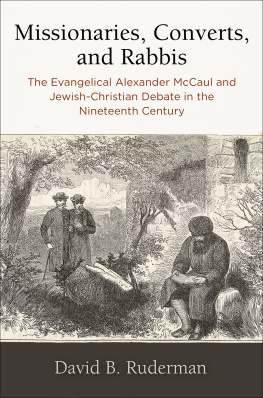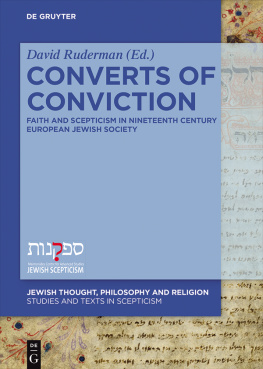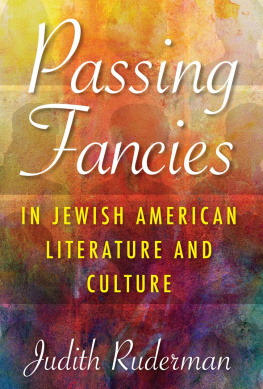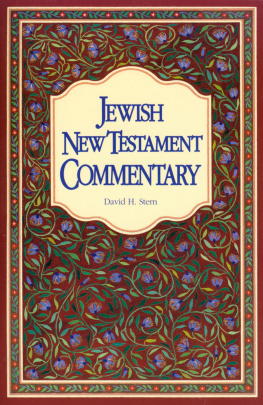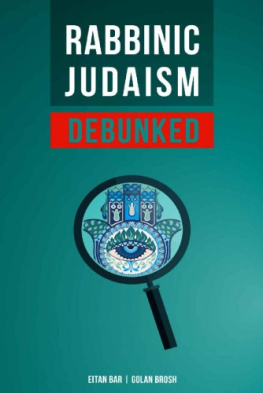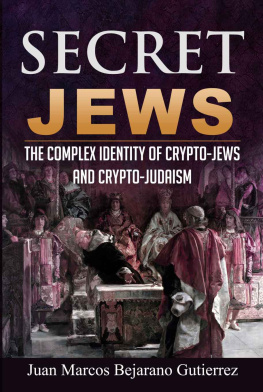Contents
Page List
Guide
Missionaries, Converts, and Rabbis
JEWISH CULTURE AND CONTEXTS
Published in association with the Herbert D. Katz Center for Advanced Judaic Studies of the University of Pennsylvania
Series Editors:
Shaul Magid, Francesca Trivellato, Steven Weitzman
A complete list of books in the series is available from the publisher.
MISSIONARIES, CONVERTS, AND RABBIS
The Evangelical Alexander McCaul and Jewish-Christian Debate in the Nineteenth Century
DAVID B. RUDERMAN
UNIVERSITY OF PENNSYLVANIA PRESS
PHILADELPHIA
Publication of this volume was aided by a generous gift from the family of Eleanor Meyerhoff Katz and Herbert D. Katz
Copyright 2020 University of Pennsylvania Press
All rights reserved. Except for brief quotations used for purposes of review or scholarly citation, none of this book may be reproduced in any form by any means without written permission from the publisher.
Published by
University of Pennsylvania Press
Philadelphia, Pennsylvania 19104-4112
www.upenn.edu/pennpress
Printed in the United States of America on acid-free paper
1 3 5 7 9 10 8 6 4 2
Library of Congress Cataloging-in-Publication Data
ISBN 978-0-8122-5214-9
For Jonah, Gabriel, Sydney, Ella, and Caleb
CONTENTS
Introduction
This book examines a chapter in the history of Jewish-Christian relations in nineteenth-century Europe, focusing on one prominent cleric and several of his associates, both allies and opponents, engaged in a broad conversation about the nature of Christianity, Judaism, and their intertwined destinies in the past and present. The central figure, the Reverend Alexander McCaul (17991863), was one of the leaders of the Protestant evangelical organization the London Society for Promoting Christianity Amongst the Jews, and a prolific author and scholar on Judaism. Educated at Trinity College, Dublin, he became absorbed in the subject of Jews and Judaism and was sent as a missionary to Warsaw in 1821, where he studied Hebrew and rabbinic literature in depth. Over the next nine years, living at the epicenter of rabbinic culture in eastern Europe, he deepened his knowledge of rabbinic texts and of living and practicing Jews. Upon his return to London, he became the principal of the Hebrew College in East London, the primary educational institution of the London Society, and eventually became professor of Hebrew and rabbinic studies at Kings College.
While McCaul and his fellow missionaries never succeeded in converting large numbers of Jews, they could always point to individuals who had come under their sway. Two Polish Jews who were deeply inspired by McCaul and considered him their spiritual mentor, at least initially, were Stanislaus Hoga (17911860) and Moses Margoliouth (181881). Hoga was converted by McCaul while still in Poland, accompanied him to London, and assumed a critical role in translating his major work against rabbinic Judaism into Hebrew. Only later in life did he sever his relationship with McCaul, openly criticize him and his missionary organization in print, and espouse a faith in Jesus still rooted in rabbinical law and practice. Margoliouth was not converted directly by McCaul but proudly acknowledged him as his primary teacher, even dedicating his first book against modern Judaism to the missionary. Despite his long career as an Anglican minister in various small parishes, Margoliouth openly displayed his cultural loyalty and personal affection for Jews and Judaism. Both converts were prolific scholars who thought deeply about Judaism and Christianity and attempted to explain and justify their own life choices in electing the Christian faith without fully relinquishing their Jewish one.
McCauls highly conspicuous role as a leading missionary to the Jews elicited both admiration and disapproval from some of his Protestant contemporaries. Two of his detractors were the evangelicals John Oxlee (17791854) and Charlotte Elizabeth Tonna (17901846). Oxlee, the so-called rector of Molesworth, was a highly accomplished Hebraic scholar who devoted much of his scholarly life to revealing the intimate connections between Jewish and Christian doctrine. While he hoped, like McCaul, for the ultimate conversion of the Jews, he strongly protested the aggressive proselytizing tactics of the London Society. Intimately involved in conversations with Jewish intellectuals, he was perceived by some as a friend and ally, especially in defending their right to live as Jews and to follow rabbinic norms. Tonna, although not a close associate of Oxlee, adopted similar positions regarding the fate of Jews living in English society. Social reformer and editor of the Christian Ladys Magazine, she was a strong advocate of the restoration of the Jews to the Holy Land. And she objected strongly to the missionary tactics of the London Society and its denigration of the sanctity and integrity of Jewish religious life.
Even more defiant were McCauls Jewish detractors. Among the not insignificant number of Jewish intellectuals who noticed and reacted to McCauls missionary pursuits and his assault on the rabbis were three prominent Jewish figures who penned elaborate responses to him: Isaac Baer Levinsohn (17881860), Samuel Joseph Fuenn (181890), and Raphael Kassin (181871). The first two were major figures of the eastern European Haskalah, advocates of social and educational reform among their coreligionists, and highly learned Hebraic scholars. Levinsohn of Kremenetz, Ukraine, composed two books against McCaul, both published posthumously, defending rabbinic Judaism while attempting to undermine each of McCauls arguments. Fuenn of Vilna completed his own substantial composition against McCaul but was unsuccessful in publishing it. Kassin, rabbi in Aleppo and Baghdad, published two books against McCaul, based on a still larger work that remained in manuscript, reacting to the impact of Protestant missionary activity that had reached as far as the Middle East.
These seven individuals thentwo evangelical Christians, two proselytes, and three Jewsconstitute the primary focus of my narrative. Their intellectual and religious itineraries all share one common feature: their profound interaction with Alexander McCaul. Each of their reactions to and encounters with the missionary and his colleagues helped shape their own attitudes to Christianity and Judaism and the relationship between the two. The network McCaul unconsciously forged with this unusual assembly of intellectuals provides a window through which to view the dynamics of a larger relationship between these two faith communities at a significant moment in the modern history of the Jewish-Christian encounter. This book accordingly is neither a history of a missionary organization from the perspective of its acolytes or critics nor a collective biography of a cluster of religious leaders. It instead seeks to capture the original reflections of several intellectuals remarkably dissimilar from each other but, nevertheless, in dialogue with one another, attempting to make sense of the past from which their respective faiths emerged and the meaning of their religious affiliation in their own era.
The story the book attempts to tell is transnational in scope. While it begins in Great Britain, it reverberates across the continent to eastern Europe and beyond to the Ottoman Empire and the Middle East. McCaul was Irish by birth, and Oxlee and Tonna were English. Hoga and Margoliouth were both Polish Jewish converts who had migrated to England and Ireland; despite their most valiant efforts, the two men were not fully recognized as English by their contemporaries, nor did they fully identify themselves with their adopted countries. Levinsohn and Fuenn, of course, were eastern European Jews at their core, and Kassin was a Syrian Jew, having wandered in Europe for several years, but who ultimately returned to the Middle East. The conversations of this books protagonists were directly stimulated by the efforts of a missionary organization originating in Great Britain but ultimately international in scope, related but clearly not identical with the political aspirations of the British Empire at a time it was enjoying the heyday of its colonizing efforts. A central part of the discussion between McCaul and his interlocutors was fixated as well on the land of Israel and its central role in the ultimate restoration of the Jews and the eschatological visions of Protestant evangelicalism.

